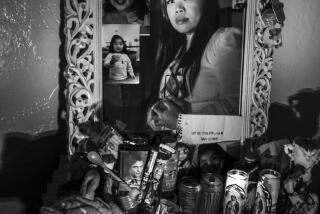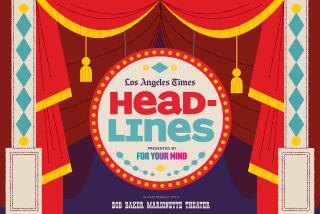Material Comforts No Salve for Adolescent Pain
- Share via
In a material sense, nothing was missing from Heidi Chamberlain’s life. Her home had a fabulous view of the Pacific. She owned a horse named Spunky. A 1996 Jeep Cherokee was parked in the driveway, awaiting the day she would turn 16--a day that never came.
Last March, in the middle of the night, the 15-year-old girl and her boyfriend, Christopher Mills, leaped to their deaths off the cliffs of the Palos Verdes Peninsula. A jogger found their broken bodies on the rocky shore 150 feet below.
“Why would she want to end her beautiful life?” Heidi’s mother, Donna, says while displaying photos of a girl with velvety skin and blond hair. “It’s not that we’re perfect, but we’re a good family. Don’t think it happens just to the obviously disturbed. It can come out of the blue and smack you.”
As Heidi’s story illustrates, wealth is no salve for adolescent pain. Indeed, studies show that suicide rates are disproportionately high among teens from affluent, well-educated families, where some parents place excessively heavy demands on their children. When those expectations aren’t met, some kids begin seeing themselves as failures, focusing their anger inward.
On the surface, Heidi, a Palos Verdes Peninsula High School student, seemed happy enough. Equestrian and soccer trophies cluttered her bedroom. A half-year before her death, she was baptized as a Mormon; she insisted on going to the seminary at 6 every morning and neither drank nor used drugs, her mother says.
Heidi’s mother worked for the PTA. Her father shunned traveling for his employment agency so he could duck out in the afternoons to coach Heidi’s soccer team.
But sometimes Heidi’s effervescence didn’t seem quite real. She would sit sullenly on the couch with her arms and legs crossed, then lock herself in her bedroom. She told her parents she felt smothered. At 15, she was allowed to begin dating--once a week on weekends. Curfew was 10 p.m.
Even though Heidi didn’t have a driver’s license, she would sneak out and take the family car for midnight cruises with friends. In February last year, Heidi went on what she had sworn was an all-girl, church-sponsored evening hike. Donna secretly followed, confronting her on the trail when she saw boys tagging along. “You lied!” Heidi’s mother scolded her.
With each deception, the rules were tightened. “I told Heidi: I’ll always love you. But I don’t have to like you,” her mother says.
By the summer before her death, Heidi was alternating between two sets of friends: clean-cut Mormons and her boyfriend’s clique, mostly boys who had more freedom, some of whom occasionally took drugs.
In her diary, Heidi described two lives. On the surface, she wore a jovial mask, but inside, she was gripped by hopelessness. When she got angry, she wrote in one poem, she felt like an ice cube melting to nothingness. “Will I ever be whole again?”
The Saturday night of Heidi’s death, Maria, the family’s cleaning lady of 12 years, revealed that she had found Christopher and Heidi home alone. Although Heidi denied the maid’s account, her mother accused her of lying and grounded her for three weeks.
About midnight, Heidi took her parents’ white Plymouth Horizon and drove to the cliffs with Christopher. At the time, she wrongly believed she was pregnant, her parents say.
“You can’t fire me. I quit,” Christopher scrawled on notebook paper found in the car, quoting grunge rocker and suicide victim Kurt Cobain.
Heidi’s note was in her bedroom. “Too bad you believed Maria and not me,” she wrote. “I don’t want to be grounded any more.”
Heidi said she would now fly with the heavenly father and her grandpa, who had died two years earlier and to whom she had been close. There were no words of affection for her parents. The note closed with a simple farewell to her sister: “I love you Heather. Bye.”
On her weekly visits to the cemetery, Donna has long talks with her daughter. She tells Heidi about her week. She asks Heidi if she is happy. Then, always, she hangs a golden angel on the tree by her child’s grave.


